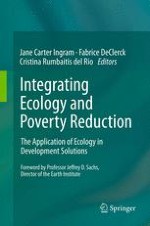2012 | OriginalPaper | Buchkapitel
13. Poverty, Payments, and Ecosystem Services in the Eastern Arc Mountains of Tanzania
verfasst von : Brendan Fisher
Erschienen in: Integrating Ecology and Poverty Reduction
Verlag: Springer New York
Aktivieren Sie unsere intelligente Suche, um passende Fachinhalte oder Patente zu finden.
Wählen Sie Textabschnitte aus um mit Künstlicher Intelligenz passenden Patente zu finden. powered by
Markieren Sie Textabschnitte, um KI-gestützt weitere passende Inhalte zu finden. powered by
